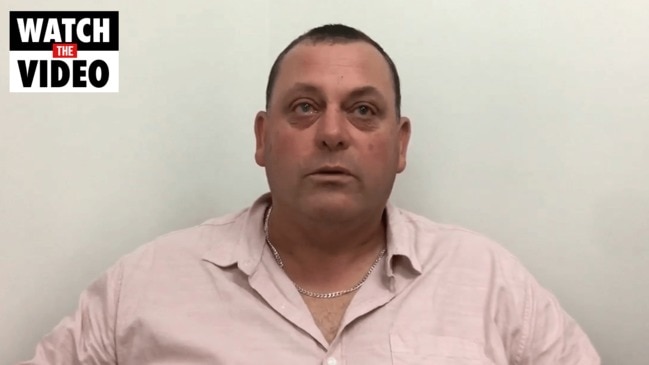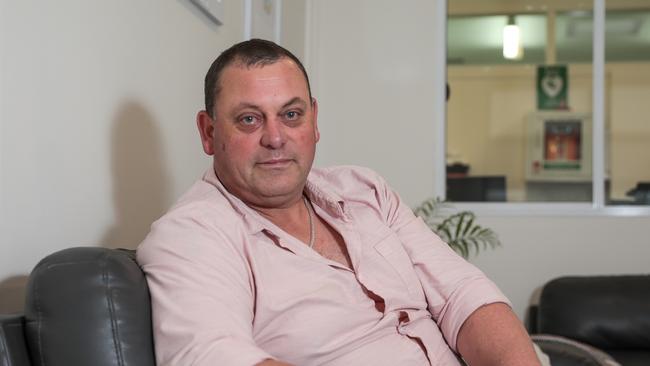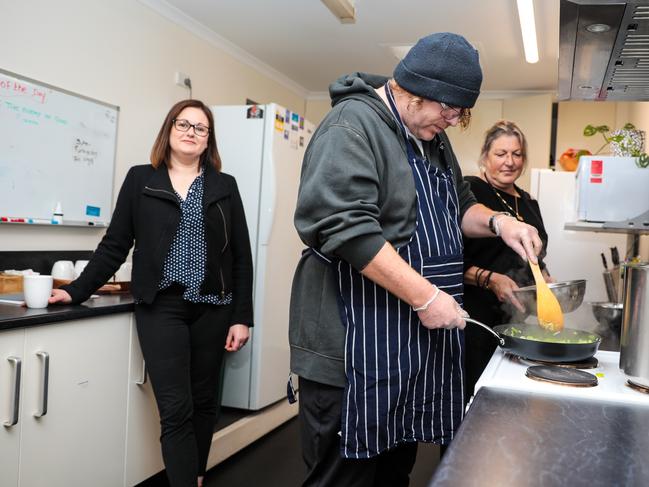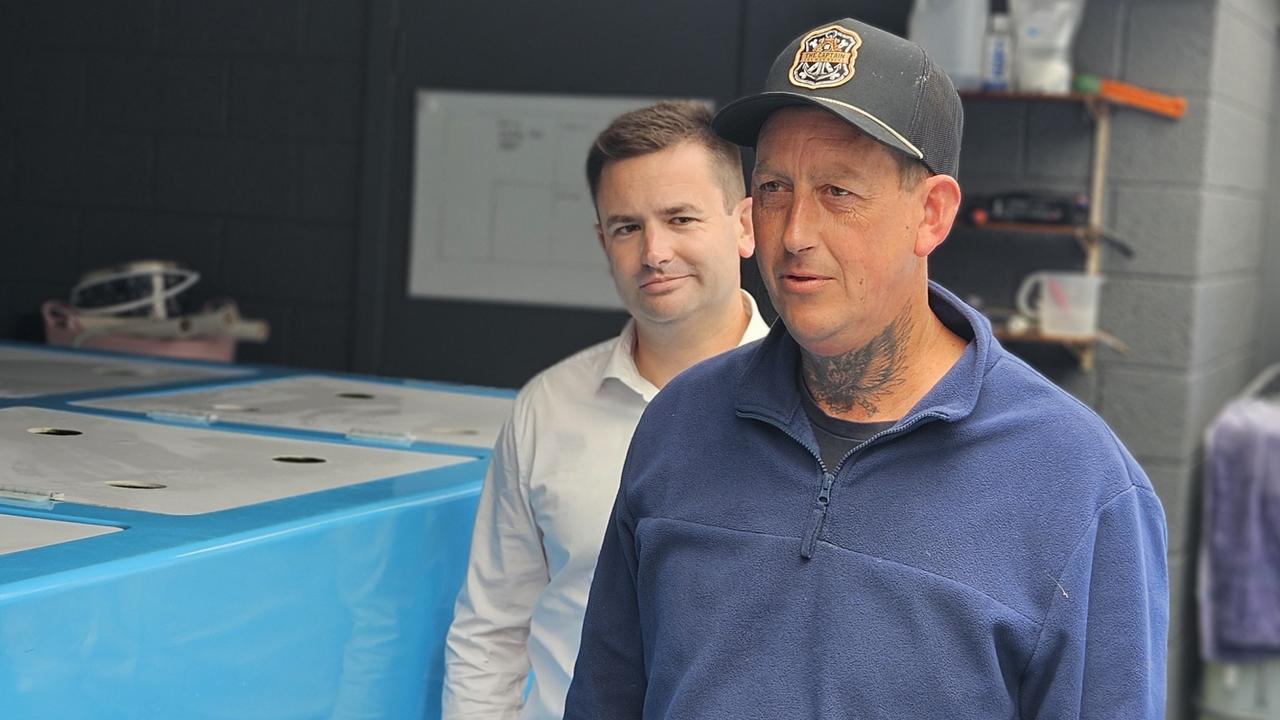‘They saved my life’: A Tassie man’s plea for more rural mental health programs
A man who was confined to a hospital bed for weeks following a serious crash has credited his recovery to a local mental health program and is calling for more services in rural areas.

Tasmania
Don't miss out on the headlines from Tasmania. Followed categories will be added to My News.
DENNIS Foster is a new man and loving life.
But earlier this year he was lying in hospital for seven weeks recovering from injuries he received after the car he was driving crashed into a power pole.
He credits Richmond Fellowship Tasmania and its caring and supportive staff with saving his life and giving him a future.
“My life has changed unbelievably thanks to them,” Mr Foster says.
“They saved my life.
“I was in a black hole and they have given me back my self-confidence and independence.”
Mr Foster, 49, who has bipolar disorder and is on a disability pension, had been living at Oatlands for seven years after a relationship break up. The father of five felt isolated and alone.
“I had been in and out of hospital since I was 18 and they thought I had depression.
“I was 35 when they finally diagnosed my bipolar.
“After the accident my daughter didn’t want me to go back to Oatlands and I was put in touch with Richmond Fellowship Tasmania. They visited me in hospital and I told them I ultimately wanted to get back to work.”

Mr Foster is living in a one bedroom unit at Richmond Fellowship Tasmania’s residential recovery program at Rokeby and regularly takes part in the many programs offered by them including social get togethers, art classes, cooking and singing.
“I found out I had sleep apnea, I have given up smoking, I’ve given up drinking alcohol which was mucking my life up and affecting my mental health.
“I’ve lost 30 kilos and I can walk up to 14km a day.
“Before I went there I couldn’t put my socks and shoes on but they have helped guide me and help with little tasks that I found so difficult to do, like change my address or get a pension card.
“I’m totally independent now. I lost my licence after the accident and I’d never caught a bus before but now I do.”
Mr Foster is critical of a lack of support for people living in rural Tasmania with mental health issues.
“We have fires and floods and relationship breakdowns and the economic effects of that can be devastating.
“There’s not enough regular support services in rural areas. Farmers and young people in the country need help or we will continue to see more suicides.”
Mr Foster hopes to complete training to get a security guard licence next year and move into his own unit or bedsit.
Demand for mental health help continues to grow
A not-for-profit organisation supporting Tasmanians facing mental health challenges has just clocked up 35 years and is continuing to expand to meet growing demand.
Richmond Fellowship Tasmania opened its first program in Lindisfarne in 1986 and was the first service in Australia that provided a therapeutic community for people with a history of mental illness funded under the Disability Services Act.
Chief executive officer Miriam Moreton said since that time, RFT services had expanded to the North and North-West and across southern Tasmania, now providing 17 programs and helping more than 1000 Tasmanians in 2020-21.
“Over the years, RFT has also added a range of clinical and community-based programs, including mental health nurse programs, outreach services, mental health programs supporting Tasmanians who are experiencing homelessness, and a recreation and capacity-building program” Ms Moreton.
“RFT also created Richmond Futures in 2018, a wholly owned subsidiary which provides independent living, support co-ordination and recovery coaching to NDIS participants statewide.”

Ms Moreton said demand for mental health services continued to grow.
“The demand for mental health services is growing across all age groups, however, in our work with other sector partners such as headspace, we are aware that younger Tasmanians are seeking mental health support in higher numbers than previously,” she said.
“Over the past decade there has been a significant improvement in societal understanding of the importance of good mental health.
“This has led to people having a greater understanding of the impact of mental illness and the importance of strong supports.”
Richmond Futures has recently opened its sixth independent living facility in Launceston.
In 2019, RFT began an AgeWise program, providing free psychological supports to people living in residential aged care facilities.
Ms Moreton said the program had grown quickly, with strong uptake from residents and now supported more than 70 residential aged care facilities state-wide.
“RFT will continue to advocate for the needs of Tasmanians experiencing mental illness and look for opportunities to continue to grow to meet the needs of the Tasmanian community,” she said.
Ms Moreton said RFT wanted to create “inclusive communities where everyone is valued”.
“The opportunity to build on the legacy of RFT and continue to develop and deliver new service offerings supporting more Tasmanians with mental health services has been a real privilege,” she said.
In the annual report tabled at RFT’s board meeting on Saturday, Ms Moreton and chairperson Ally Mercer said in the past year more people had been helped than ever before.
“Together with our stakeholders, we have risen to meet the needs of participants to not only survive, but recover and build meaningful lives,” they said.
More Coverage
Originally published as ‘They saved my life’: A Tassie man’s plea for more rural mental health programs





